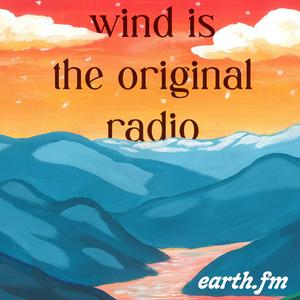Interview: George Vlad
“Sound is life for me.”
The latest installment of the Earth.fm podcast, Wind Is the Original Radio, finds curator Melissa Pons in conversation with sound recordist and expedition leader George Vlad. You can listen to and read George’s work elsewhere on the site - and you may already have heard recordings of his in high-profile projects such as Dune: Part Two and Mufasa: The Lion King, as well as various documentaries, TV series, podcasts, and audiobooks.
The love of George’s life, as a recordist and collector of sounds, is to be among wildlife sounds, trying to understand them, and getting to share them. Though he confesses to being initially fastidious about avoiding anthropophony, he explains that he has become more understanding and flexible, given how reductive it is to imagine that nature is separate from humans (and vice versa): “We are moving forward, whether we like it or not; progress happens: people need to travel and use power tools.” However, though he has become more open to recording people, he draws a line at combustion engines.
He also shares about his journey from being a sound designer, when he originally saw field recordings as purely “tools or assets”, with no appreciation for the ecosystems they originated from. However, informed by his experience of growing up in the Romanian countryside - which taught him the value of loving nature and of living with it rather than trying to control it - he subsequently came to appreciate and take enjoyment from their beauty.
Additional topics addressed during the episode include:
The “heavy question” of decolonising sound recording and working ethically as a recordist outside of one’s home culture. And, how working respectfully with locals can provide information that, as an outsider, he wouldn’t otherwise be privy to - but also the importance of choosing what to share, considering the importance of certain areas to Indigenous peoples
“Being careful, being mindful, trying not to create tension and problems; this is just being a human, being a nice person, having common sense - it's not just about sound recording.” Where some recordists cause damage, ignore local taboos, or go chasing after animals, George has learned to be more mindful, preferring to work with passive-recording drop-rigs, which are not only easier for him, but less disruptive for wildlife
Fellow recordists who see going back to camp and having a cup of tea as ‘cheating’ and consider suffering to add value to the work. While George has taken part in extreme expeditions (for example, in Sumatra and Gabon), “It was tough; I got a bunch of diseases, and it was painful, and I had to come back and spend two months taking antibiotics and trying to get better - but that didn't make the sound recordings better.” Alternatively, sometimes you're in air-conditioned lodges and being driven around (where it's unsafe to walk) - but that this is equally valid. Being attracted to the 'extremeness' of the experiences is ultimately only a way of making everything about yourself, and “that's just focusing on the wrong aspect; the soundscapes and the sound recordings are more valuable than the effort you put in, or the leeches that suck your blood”
Things that George is afraid of in the field - which turns out to not be a lot, something he puts down to being brought up around cats, which can transmit Toxoplasma gondii to humans: a parasitic infection which reduces fear responses and increases risk-taking. However, he does fear losing his kit on a job
Memorable field-recording experiences, including “sleeping on the edge of an active volcano in Ethiopia, without having taken any precautions” against the silica suspended in its gaseous emissions, which can cut up the lungs like broken glass… On the advise of a geologist who turned out not to have any experience of volcanoes
How to incorporate study and research into a busy practice - not a problem when you “find it hard not to read”, and when research fuels excitement about new destinations. Also: recommendations of books for burgeoning recordists - not just ones on the subject of field recording itself, but useful adjacent ones, like learning to drive off-road, climb trees, or take up photography
How to support conservation - not only in the form of international NGOs like WWF, but also tiny three-person initiatives where donations more appreciably go further (as long as you check that they’re doing what they say they’re doing!). Plus, training others in sound recording, who can potentially continue to record in their local environments when itinerant recordists have moved on
What George would like to see in the future of sound recording - not just for sound recordists to be properly compensated, but for this work to become established as an valued art form in its own right, with more courses, teachers, and the corresponding improvement in people’s ability to listen and pay attention to the world around them.
Plus! The importance of making jam, playing video games, and reading Jules Verne.
George would be delighted if you’d like to engage with his work, so feel free to follow him on his YouTube channel.

